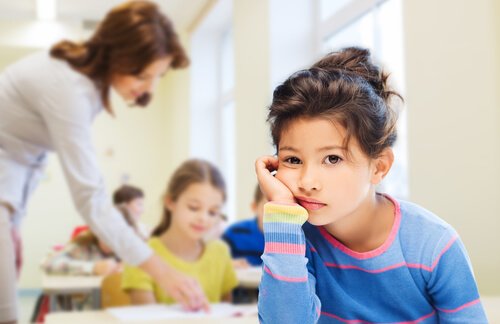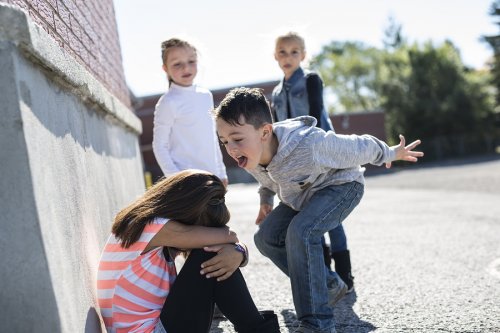What to Do About Children Who Misbehave in Class


Reviewed and approved by the psychologist María Alejandra Castro Arbeláez
Parents and educators constantly worry about children’s behavior at school. What can we do when it comes to children who misbehave in class or are victims of bullying? These are complex situations that we’d like to discuss in this article.
When we talk about children who misbehave in class, we refer specifically to those who don’t pay attention, who ignore their teachers, and who treat their classmates poorly. It’s not always possible to eradicate school bullying, but it should be the ultimate goal in the long run.
To prevent and solve this problem, there are certain things that the adults in charge should know. We’ve outlined some of them below.
Things that cause children to misbehave in class
One of the first things that can lead to bad behavior in school is a need for attention. Mainly, this occurs when parents don’t dedicate the necessary time to their children. Or, if they do, that time isn’t of sufficient quality.
As a result, children resort to poor behavior as a “decoy” so that adults’ attention is dedicated to them, even in a negative way.
A second possible cause of this problem can be poor imposition of limits at home. If children are used to doing whatever they want, they don’t know how to recognize the rights of their peers or even the orders of their superiors at school.
A third trigger worth noting is children’s inability to control their emotions and, as a consequence, their responses to them.
Children may also experience certain psychological conditions that prevent them from feeling calm and focused. Usually, these cases are uncommon and are resolved with therapy.

Actions to take with children who misbehave in class
In the case of school misconduct, all adults close to the child must take part in resolving the problem. Of course, this includes parents and teachers.
Here are some practices that may be beneficial to solving this problem:
1. Give attention and affection
Just as a lack of attention was the first cause we mentioned, the first recommendation on this list has to do with addressing that very problem.
Children should feel heard and loved by their parents. This preserves their emotional stability, and they won’t find it necessary to resort to misbehavior to achieve what they want.
“One of the main things that leads to bad behavior in school is a need for attention.”
2. Don’t give up authority
This is valid advice for both parents and teachers. In no way should authority be granted to children who misbehave in class all the time. This only reinforces their behavior.
On the contrary, working on setting limits is a priority in these situations. Both at home and at school, children should know they cannot count on the threat of “misbehaving” when they want something.
3. Keep them motivated and busy
Not everything comes down to confronting a child who behaves poorly. In fact, we should try to earn their good predisposition by engaging them in interesting and motivating activities.
They should leave aside their poor behavior and exchange it for a proactive, positive attitude of understanding and respect.

4. Communication between parents and teachers
As we mentioned before, parents must be constantly involved in their children’s school life. They have to be aware of everything: subjects in which they perform well, those in which they struggle, and above all, their relationship with their environment.
To do this, parents can chat with teachers to understand what happens in the classroom. However, for this to be viable, it’s of course also necessary for the teachers to be observant and attentive.
After all, the teachers are the ones in charge of the children, and they know better than anyone what happens in the classroom. In addition, they can work together with parents to develop particular strategies to help their children at home.
Although they may seem obvious, these techniques are the first steps to follow if you have to deal with cases of children who misbehave in class. Before applying hasty punishments, we should turn to other more productive solutions for the future of each child.
Parents and educators constantly worry about children’s behavior at school. What can we do when it comes to children who misbehave in class or are victims of bullying? These are complex situations that we’d like to discuss in this article.
When we talk about children who misbehave in class, we refer specifically to those who don’t pay attention, who ignore their teachers, and who treat their classmates poorly. It’s not always possible to eradicate school bullying, but it should be the ultimate goal in the long run.
To prevent and solve this problem, there are certain things that the adults in charge should know. We’ve outlined some of them below.
Things that cause children to misbehave in class
One of the first things that can lead to bad behavior in school is a need for attention. Mainly, this occurs when parents don’t dedicate the necessary time to their children. Or, if they do, that time isn’t of sufficient quality.
As a result, children resort to poor behavior as a “decoy” so that adults’ attention is dedicated to them, even in a negative way.
A second possible cause of this problem can be poor imposition of limits at home. If children are used to doing whatever they want, they don’t know how to recognize the rights of their peers or even the orders of their superiors at school.
A third trigger worth noting is children’s inability to control their emotions and, as a consequence, their responses to them.
Children may also experience certain psychological conditions that prevent them from feeling calm and focused. Usually, these cases are uncommon and are resolved with therapy.

Actions to take with children who misbehave in class
In the case of school misconduct, all adults close to the child must take part in resolving the problem. Of course, this includes parents and teachers.
Here are some practices that may be beneficial to solving this problem:
1. Give attention and affection
Just as a lack of attention was the first cause we mentioned, the first recommendation on this list has to do with addressing that very problem.
Children should feel heard and loved by their parents. This preserves their emotional stability, and they won’t find it necessary to resort to misbehavior to achieve what they want.
“One of the main things that leads to bad behavior in school is a need for attention.”
2. Don’t give up authority
This is valid advice for both parents and teachers. In no way should authority be granted to children who misbehave in class all the time. This only reinforces their behavior.
On the contrary, working on setting limits is a priority in these situations. Both at home and at school, children should know they cannot count on the threat of “misbehaving” when they want something.
3. Keep them motivated and busy
Not everything comes down to confronting a child who behaves poorly. In fact, we should try to earn their good predisposition by engaging them in interesting and motivating activities.
They should leave aside their poor behavior and exchange it for a proactive, positive attitude of understanding and respect.

4. Communication between parents and teachers
As we mentioned before, parents must be constantly involved in their children’s school life. They have to be aware of everything: subjects in which they perform well, those in which they struggle, and above all, their relationship with their environment.
To do this, parents can chat with teachers to understand what happens in the classroom. However, for this to be viable, it’s of course also necessary for the teachers to be observant and attentive.
After all, the teachers are the ones in charge of the children, and they know better than anyone what happens in the classroom. In addition, they can work together with parents to develop particular strategies to help their children at home.
Although they may seem obvious, these techniques are the first steps to follow if you have to deal with cases of children who misbehave in class. Before applying hasty punishments, we should turn to other more productive solutions for the future of each child.
All cited sources were thoroughly reviewed by our team to ensure their quality, reliability, currency, and validity. The bibliography of this article was considered reliable and of academic or scientific accuracy.
- Carreño, A. M. P. (2010). Conductas disruptivas en el aula. González Serrano, Fernando. https://archivos.csif.es/archivos/andalucia/ensenanza/revistas/csicsif/revista/pdf/Numero_34/ANA_MARIA_PORCEL_1.pdf
- Espot, M. R., & Nubiola, J. (2015). La disciplina en el aula. Vanguardia Educativa, 35-39. http://www.mariarosaespot.es/pdfs/pdf_articulo_la_disciplina_en_el_aula_ve_19va._edicion__copia__copia.pdf
- Pérez-de-Guzmán, V., Muñoz, L. V. A., & Vergara, M. V. (2011). Resolución de conflictos en las aulas: un análisis desde la Investigación-Acción. Pedagogía social: revista interuniversitaria, (18), 99-114. https://dialnet.unirioja.es/servlet/articulo?codigo=3430407
- Pérez, C. P. (2001). Estrategias para la solución de conflictos en el aula. Revista española de pedagogía, 143-156. https://www.jstor.org/stable/23765854?seq=1
This text is provided for informational purposes only and does not replace consultation with a professional. If in doubt, consult your specialist.








